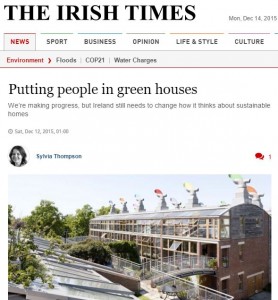Article by Sylvia Thompson – Published in the Irish Times – Sat. 12th December 2016
As we digest the warnings and promises from the UN Climate Change Conference in Paris, there is one industry that is poised for major change in Ireland and abroad: construction.
“Every newly built house in Ireland now has to have an A3 BER” – or building energy rating – “under the 2011 building regulations,” says Pat Barry of theIrish Green Building Council (igbc.ie). And, although this heralds a new era in green building, the work involved in improving the energy ratings of the 1.7 million existing homes is the other side of the coin.
Some progress has been made through two grant schemes run by theSustainable Energy Authority of Ireland (seai.ie), Better Energy Communities and Better Energy Warmer Homes, which help to cover the cost of retrofitting insulation, upgrading boilers, installing smart meters and switching to renewable energy, among other fuel-saving measures. There has also been some success because of energy providers’ EU obligations to save energy by working with communities to reduce fuel poverty and improve efficiency.
But there is still a strong sense that Ireland lags behind many other countries in becoming a nation of energy-efficient homes. Last year the Department of Communications, Energy and Natural Resources published Better Buildings, Ireland’s first National Renovation Strategy, for instance, which aims to reduce emissions from the country’s buildings. But it lacks goals, and Ireland is off course to meet the overall EU target of saving 20 per cent of projected energy use by 2020 and 27 per cent by 2030.
Buildings account for about 12 per cent of the Irish greenhouse-gas emissions, and improving buildings’ energy efficiency is one of the cheapest ways to cut that figure.
But to do this, organisations such as the Irish Green Building Council believe, the Government and local authorities must understand the benefits of sustainable housing. “The Department of Health needs to see that decent housing is part of a public-health strategy, that fuel poverty and people attending A&E departments with respiratory problems are linked to poor-quality housing,” Pat Barry says.
And building contractors will need to get to grips with sustainable building methods. “There aren’t enough renovation skills in Ireland. Poor-quality insulation is worse than none at all. For example, it’s critically important that good ventilation is understood by everyone in the building trade,” says Barry.
A hundred builders took part in the council’s three-day Qualibuild scheme this year; from next year the EU-funded scheme is open to all builders. And the council has just published an e-book for homeowners, explaining what is required for a house to be properly insulated.
For example, the concept of deep retrofitting – where floors, attics and walls are insulated, boilers upgraded and air-tight doors and windows created – isn’t widely understood in Ireland. “What happens with a shallow retrofit – attic insulation and a new boiler, for example – is that people absorb the extra comfort into their homes with no energy savings,” Barry says.
Another key issue in green building is that of cost. Dún Laoghaire-Rathdown County Council recently decided that all new buildings in its area should meet passive-house standards. This usually means thick insulation, triple-glazed windows, solar-powered hot water, and a heat pump or other form of renewable energy, and it would enable both commercial and residential buildings to dispense with conventional heating systems.
But the Construction Industry Federation has warned that the standard will increase prices, and Nama has urged the council to reconsider the requirement. Supporters of the passive-house standard argue that building costs are not necessarily higher and that money is also saved over a lifetime of tiny heating bills.
Barry says that the passive-house standards are higher than current building regulations but that costs depend on several factors. “Green building shouldn’t cost more if the architect, construction contractor and construction workers are all trained well. It’s down to good design, quality building and quality supervision of work.”
Greener future: Paris zero-carbon pledge
France’s minister for ecology, Ségolène Royal, led the first day dedicated to buildings at the COP21 UN Climate Change Conference in Paris. The message was that “green buildings are possible, healthy and profitable” – and the outcome of the day was that 25 Green Building Councils committed to register, renovate or certify more than 1.25 billion square metres of green building space and train more than 125,000 green-building professionals by 2020.
All 74 national green building councils at the event supported the World Green Building Council’s commitment to achieve net-zero-carbon new building and energy-efficient refurbishment of existing buildings by 2050. A net-zero-carbon building – or net-zero-energy building, known as an NZEB in the trade – is one whose annual energy consumption roughly equals the amount of renewable energy created on the site.
Buildings account for about a third of global emissions, and green buildings are one of the most cost-effective solutions to climate change, partly because it’s cheaper to save energy through more efficient design than it is to produce it differently. The development of materials for green buildings brings jobs to economies, and green buildings have better indoor air quality, leading to more pleasant and healthier living and working environments. Several large construction-material firms, including Ecocem, Kingspan and Saint-Gobain, pledged to reduce emissions, increase low-carbon investments and use more clean energy to tackle climate change.
Such is the growth in the green building sector that green building will account for more than a third of the entire US construction sector by 2018.

